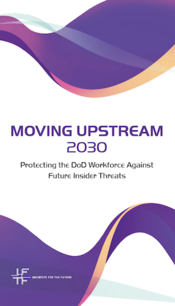Moving Upstream 2030

In late 2019, the DoD Counter-Insider Threat Program, Office of the Under Secretary of Defense for Intelligence & Security (OUSD[I&S]), and The Threat Lab, engaged Institute for the Future (IFTF) to identify and analyze the external future forces that will emerge over the next decade to help DoD better protect its workforce for the long-term future.
The goal of this research has been to proactively
identify emerging threat vectors that provide the opportunity to create innovative, holistic, and positive mitigation and prevention strategies that will push intervention upstream.
Organized around the STEEP framework,
Upstream 2030 explores the following themes:

SOCIAL
Shifting Identities, Roles, and Family
Dynamics changing patterns in how people form families and self-identify will challenge institutions to quickly adapt practices and processes.
Increasing Loneliness and Disaffiliation
Increases in loneliness and declines in civic participation demand new approaches to building community within the workplace.

TECHNOLOGICAL
Compromised Cybersecurity and Resilience
Navigating cybersecurity risks— and minimizing their damage— will require approaches that rely on strengthening the technical capabilities of systems and awareness of risks among the workforce.
Intentional Manipulation of Perceptions
Misinformation becomes more sophisticated and targeted, creating increased confusion
about what is real.

ECONOMIC
Fissuring of Work
The erosion of formal employment has created new financial security challenges, increased expectations for flexibility, and growing needs for stability.
Extreme Winners and Losers
The digitization of the economy is causing financial outcomes to diverge, creating new threats of IP theft and increasing inequality.

ENVIRONMENTAL
Persistent Climate Risk and Volatility
Climate change becomes an increasing source of chronic and acute mental health challenges.
New Measures of Risk and Resilience
New ways of quantifying elements in our environment point toward novel ways to use local interventions to improve resilience.

POLITICAL
Polarized Communities
Growing polarization makes disagreements feel like personal attacks, which get further exacerbated by negative feedback loops from social networks.
Mitigating Institutional Mistrust
Continued increases in institutional mistrust spur the creation of metrics-based systems that will mature over the coming decade.
Download the deliverables here:
© 2020 Institute for the Future. All rights reserved. All brands and trademarks remain the property of their respective owners. CC BY-NC-ND 4.0
About Institute for the Future
Institute for the Future is the world’s leading futures organization. For more than 50 years, businesses, governments, and social impact organizations have depended upon IFTF global forecasts, custom research, and foresight training to navigate complex change and develop world-ready strategies. IFTF methodologies and toolsets yield coherent views of transformative possibilities across all sectors that together support a more sustainable future. Institute for the Future is a registered 501(c)(3) nonprofit organization based in Palo Alto, California.
About The Threat Lab
The Defense Personnel and Security Research Center (PERSEREC) founded The Threat Lab in 2018 to realize the Department of Defense Counter-Insider Threat Program Director’s vision to incorporate the social and behavioral sciences into the mission space. Our team is headquartered in Seaside, California, and includes psychologists, sociologists, policy analysts, computer scientists, and other subject matter experts committed to workforce protection. For more information on The Threat Lab, please email dodhra.ThreatLab@mail.mil.
Contact us
Brad Kreit | Project Lead | IFTF Research Director | bkreit@iftf.org
Jean Hagan | IFTF Executive Producer | jhagan@iftf.org
Georgia Gillan | Project Manager | Research Manager | ggillan@iftf.org




